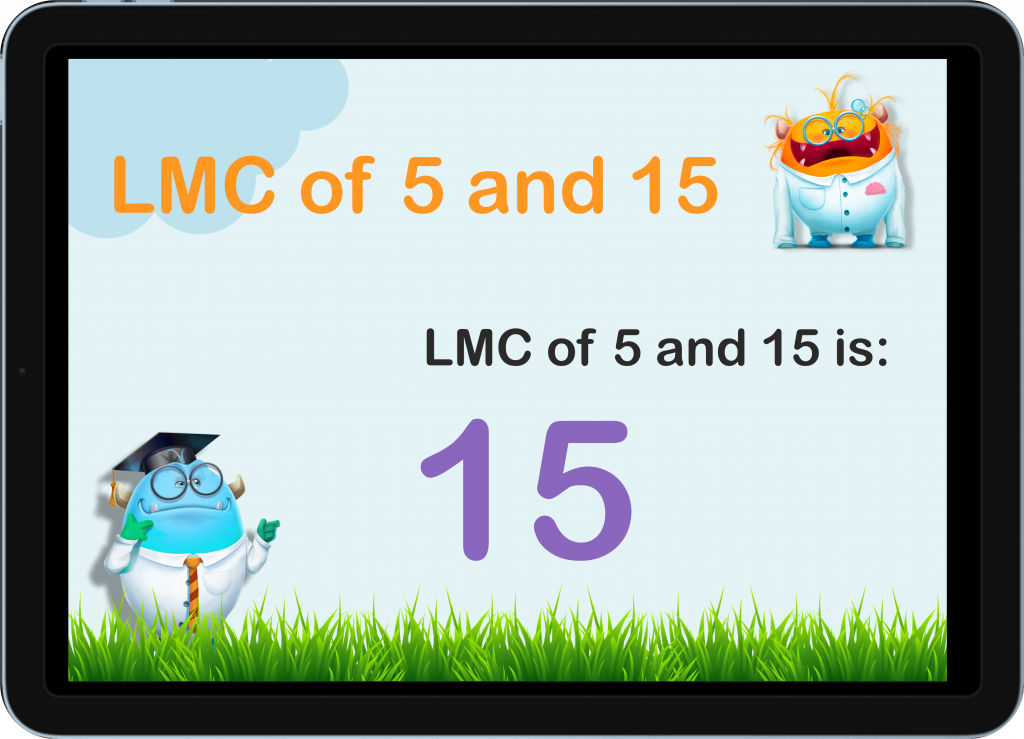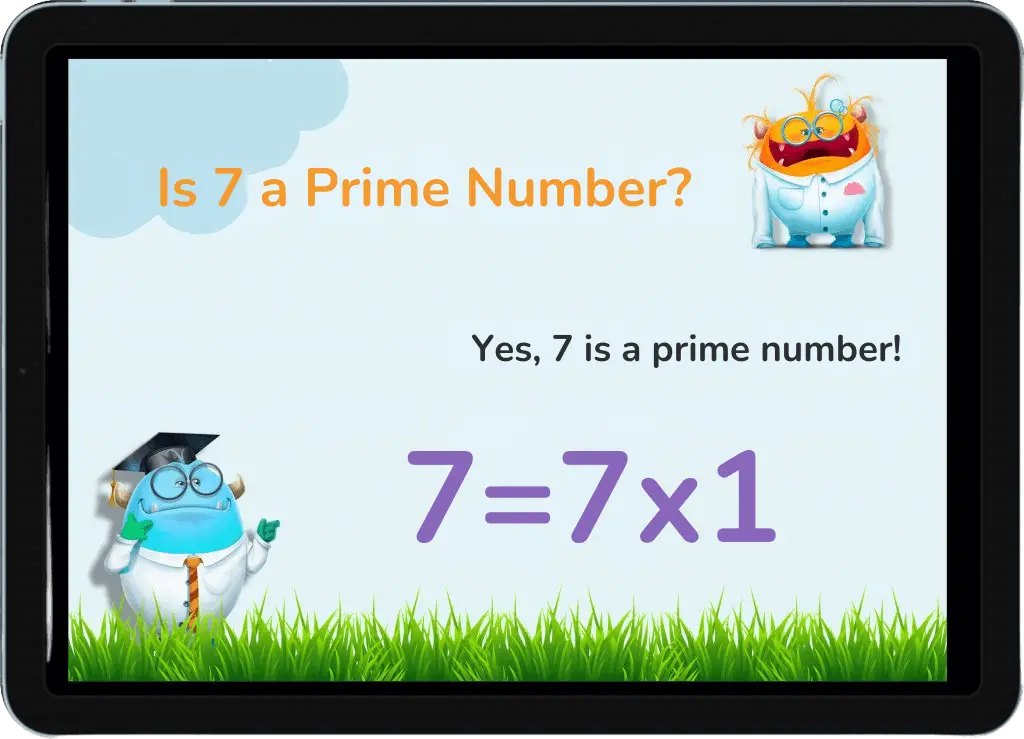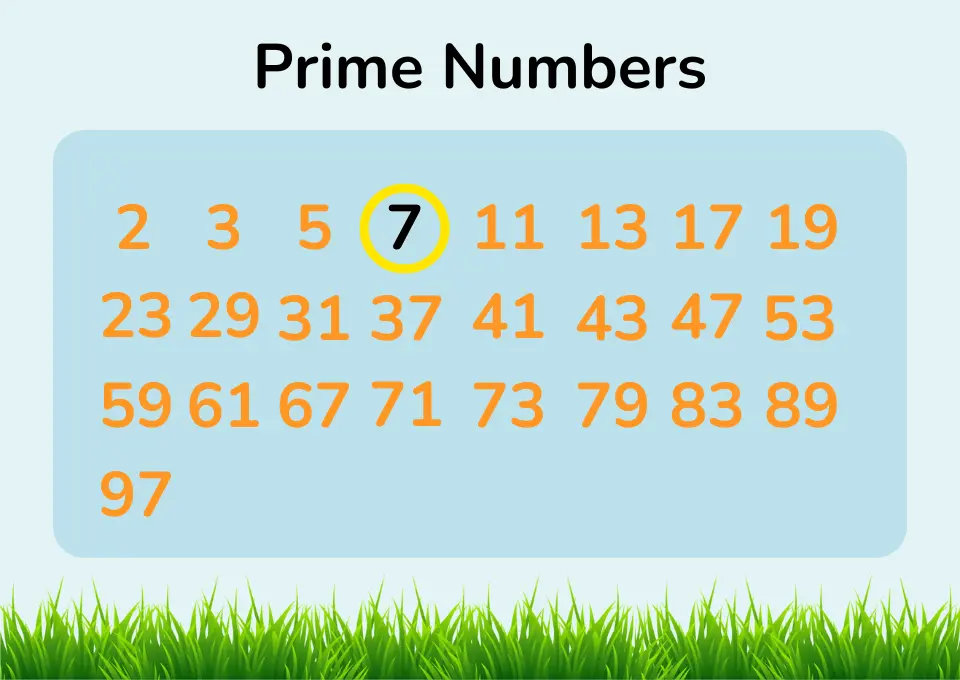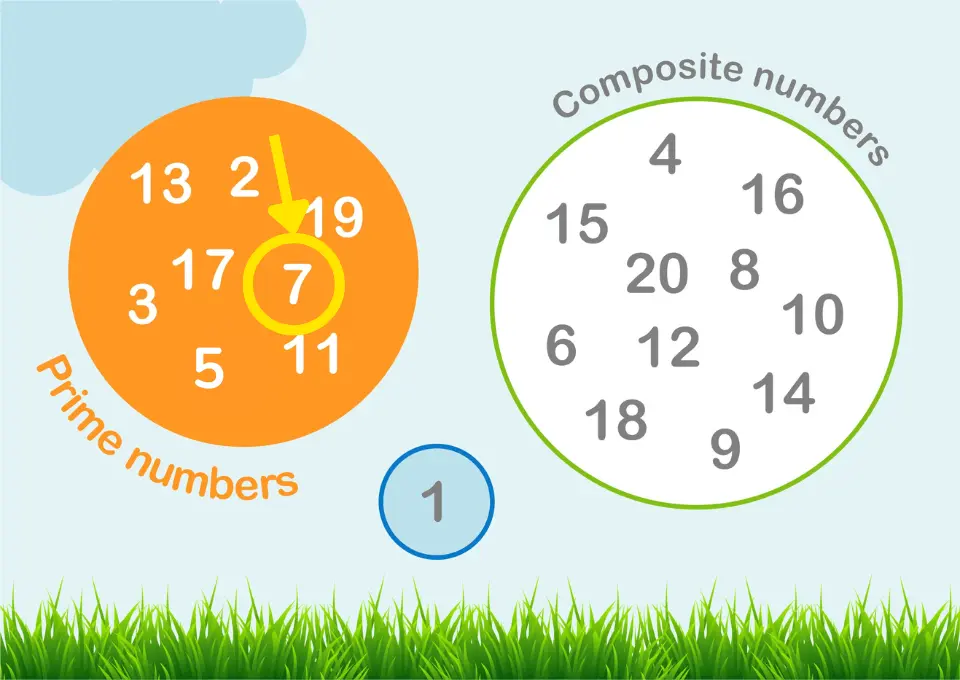Is 2 A Prime Number?
Prime vs. Composite Numbers
Greetings, young math enthusiasts! Today, let’s set sail on a mathematical voyage to determine if 2 is a prime number, and learn more about the difference between prime and composite numbers.

Is 7 a Prime Number?
Or Is 7 a Composite Number?
Get ready for a number adventure! Today, we’re diving into the exciting world of 7 to discover if it’s a prime number—let’s find out!


No credit card required

No credit card required
What are Prime Numbers?
Is 7 a Prime Number?
Double-check if 7 is a Prime Number
Why is 7 a Special Prime Number?
Fun Facts About 7 as a Prime Number
Is 7 a Twin Prime?
Is 7 a Cousin Prime?
Is 7 a Sexy Prime?
Is 7 a Composite Number?
Have you ever wondered about the secrets hidden in numbers? The number 7 is one of math’s rare gems, special and captivating. Today, we’re exploring the enchanting world of 7. Are you ready for this fun adventure? We know you are!
What are Prime Numbers?
Prime numbers are like special number superheroes! They can only be divided by 1 and themselves, which means no other numbers can sneak in. For example, 2, 3, and 5 are all prime numbers. They stand alone, making them unique and fascinating!
Is 7 a Prime Number?

Yes, 7 is a prime number. It can only be evenly divided by 1 and itself, leaving no remainder. This means 7 has no divisors other than 1 and 7. Thus, it qualifies as a prime number.
Let’s Double-check if 7 is a Prime Number
To confirm that 7 is indeed a prime number, we need to ensure that 7 cannot be evenly divided by any number other than 1 and itself. Here’s the process:
- Is 7 divisible by 2? No, because 7 is an odd number and can’t be divided by 2.
- Is 7 divisible by 3? Add the digits of 7 (7), which is not divisible by 3.
- Is 7 divisible by 5? No, because it doesn’t end in 0 or 5.
Since 7 isn’t divisible by 2, 3, or 5, and there are no other smaller numbers to check, we can confidently say that 7 can only be divided by 1 and itself. Congratulations, 7, you are a prime number!
Let’s Keep Digging!
Now, let’s confirm this. We’ve already checked the smaller numbers, but there’s a method called “trial division.” This technique involves dividing 7 by all prime numbers less than its square root. The square root of 7 is approximately 2.6, so we only need to check the primes 2.
7 ÷ 2 = 3.5 (not a whole number)
Since this division doesn’t result in a whole number, it confirms that 7 is indeed a prime number.
Why is 7 a Special Prime Number?
The number 7 is more than just a digit; it holds a special place in various aspects of life and culture. Maybe, moreso than any other number known to a man!
From its frequent appearance in traditions and nature to its unique mathematical properties, 7 captivates and intrigues. Let’s explore some fascinating fun facts about this remarkable number.
Lucky Number
The number 7 is often seen as a lucky number in many cultures and religions. People believe it brings good fortune and positive energy, making it a favorite in games and folklore.
Days of the Week
There are 7 days in a week: Monday, Tuesday, Wednesday, Thursday, Friday, Saturday, and Sunday. This cycle of seven days is used worldwide, organizing our lives into a regular rhythm.
Wonders of the World
The 7 wonders of the ancient world include majestic constructions like the Great Pyramid of Giza and the Hanging Gardens of Babylon. These wonders symbolize human creativity and achievement.
Rainbow Colors
The rainbow has 7 colors: red, orange, yellow, green, blue, indigo, and violet. This colorful spectrum appears after rain showers when sunlight refracts through water droplets.
Musical Notes
There are 7 basic musical notes in a scale: Do, Re, Mi, Fa, Sol, La, and Ti. These notes form the foundation of music, creating melodies and harmonies we enjoy every day.
Continents
There are 7 continents on Earth: Africa, Antarctica, Asia, Europe, North America, Oceania, and South America. Each continent is unique, offering diverse cultures, landscapes, and wildlife.
Seas
Historically, there are said to be 7 seas, representing the vastness and mystery of the world’s oceans. These seas have been vital for exploration, trade, and cultural exchange throughout history.
Fun Facts About 7 as a Prime Number
Mersenne Prime
7 is a Mersenne prime, which means it is one less than a power of two (2^3 – 1 = 7). These primes have special significance in number theory and cryptography.
Double Mersenne Prime
7 is also a double Mersenne prime since the exponent 3, used in its Mersenne prime form, is itself a Mersenne prime (2^2 – 1 = 3). This rarity adds to the uniqueness of 7.
Newman–Shanks–Williams Prime
7 is classified as a Newman–Shanks–Williams prime, a special type of prime related to a particular recursive sequence. These primes are named after mathematicians who studied them.
Woodall Prime
As a Woodall prime, 7 fits into a unique category defined by the formula n * 2^n – 1. This property connects it to a distinctive set of primes.
Factorial Prime
7 is a factorial prime, meaning it is one more or one less than a factorial number (7 = 3! + 1). This links it to the concept of factorials, which are products of all positive integers up to a certain number.
Harshad Number
7 is a Harshad number, which means it is divisible by the sum of its digits. In this case, 7 is trivially divisible by itself.
Lucky Prime
7 is considered a lucky prime, part of a sequence derived by a sieve similar to the Sieve of Eratosthenes. These primes are not only rare but also steeped in mathematical tradition.
Happy Number
7 is a happy number, meaning it leads to 1 when replaced by the sum of the squares of its digits, repeatedly. This makes it a happy prime, a subset of primes with a cheerful trait.
Safe Prime
As the only Mersenne safe prime, 7 holds a unique position. Safe primes are of the form 2p + 1, where p is also prime. In this case, 7 is special because both it and 3 (its corresponding smaller prime) are Mersenne primes.
Leyland Prime of the Second Kind
7 is a Leyland prime of the second kind, defined by the equation x^y + y^x where x and y are integers greater than 1. This equation showcases another layer of its mathematical elegance.
Heegner Number
7 is the fourth Heegner number, significant in number theory and the study of quadratic fields. Heegner numbers are tied to the resolution of certain Diophantine equations, highlighting the mathematical beauty of 7.
Is 7 a Twin Prime Number?
Yes, 7 is a twin prime number. Twin primes are pairs of prime numbers that differ by exactly 2. In this case, 7 pairs with 5, another prime number, making them a twin prime pair.
Is 7 a Cousin Prime Number?
Yes, 7 is a cousin prime number, and interestingly, it forms two cousin prime pairs. Cousin primes are pairs of prime numbers that differ by exactly 4. In this case, 7 pairs with both 3 and 11, as 7 – 3 = 4 and 11 – 7 = 4. So, 7 is like a double cousin prime!
Is 7 a Sexy Prime Number?
Yes, 7 is a sexy prime. Sexy primes are pairs of prime numbers that differ by exactly 6. In this case, 7 pairs with 13, as 13 – 7 = 6, making them a sexy prime pair.
Is 7 a Composite Number?

Conclusion
Smartick offers fantastic free courses that make learning about prime numbers and more fun and engaging. With interactive lessons and games, Smartick turns math into a playful adventure.
You’ll enjoy each session as you explore new mathematical concepts in an exciting way.
Why wait? Try Smartick and discover the joy of math!
Learn More About Prime Numbers
© 2024 Smartick. All Rights Reserved.
